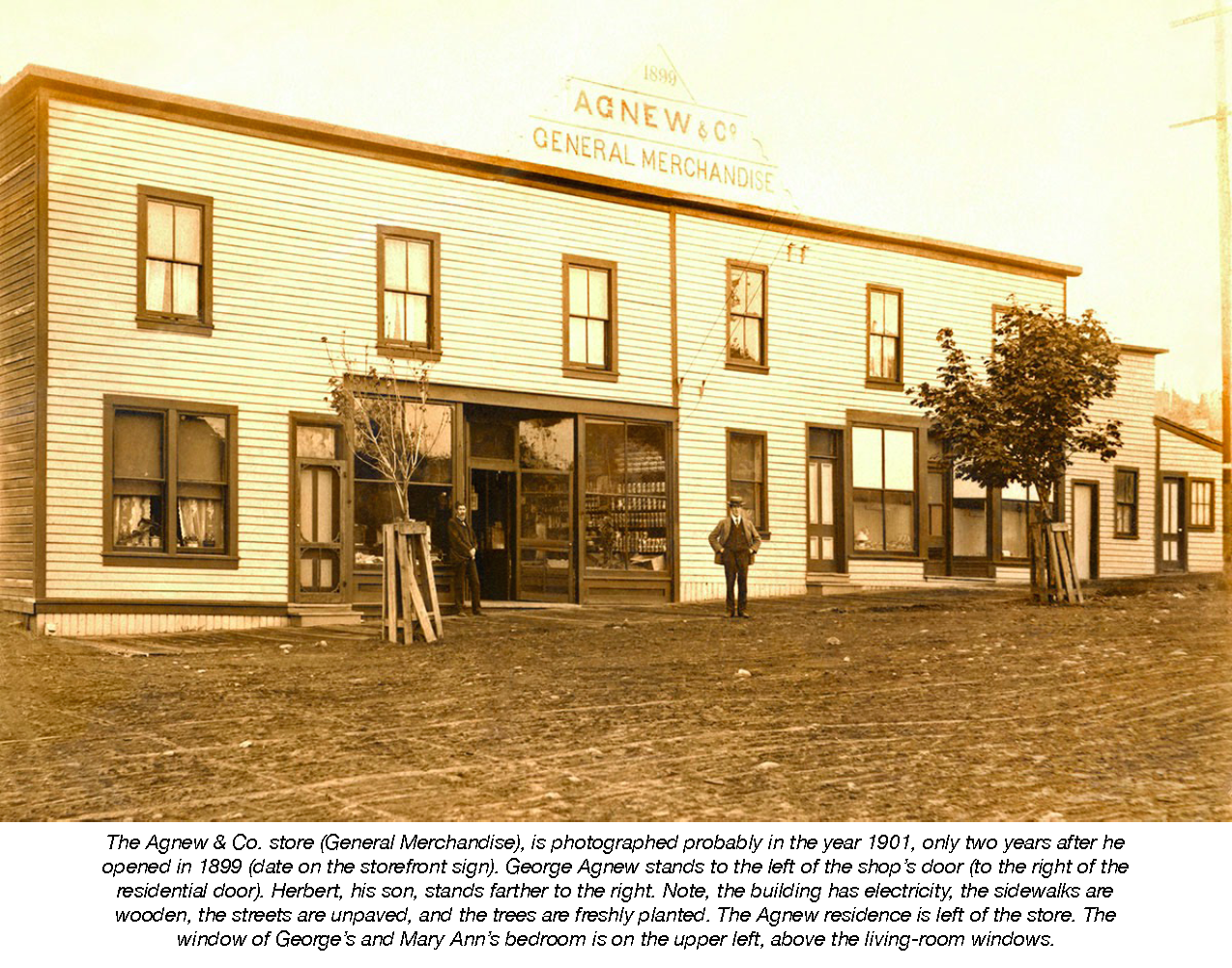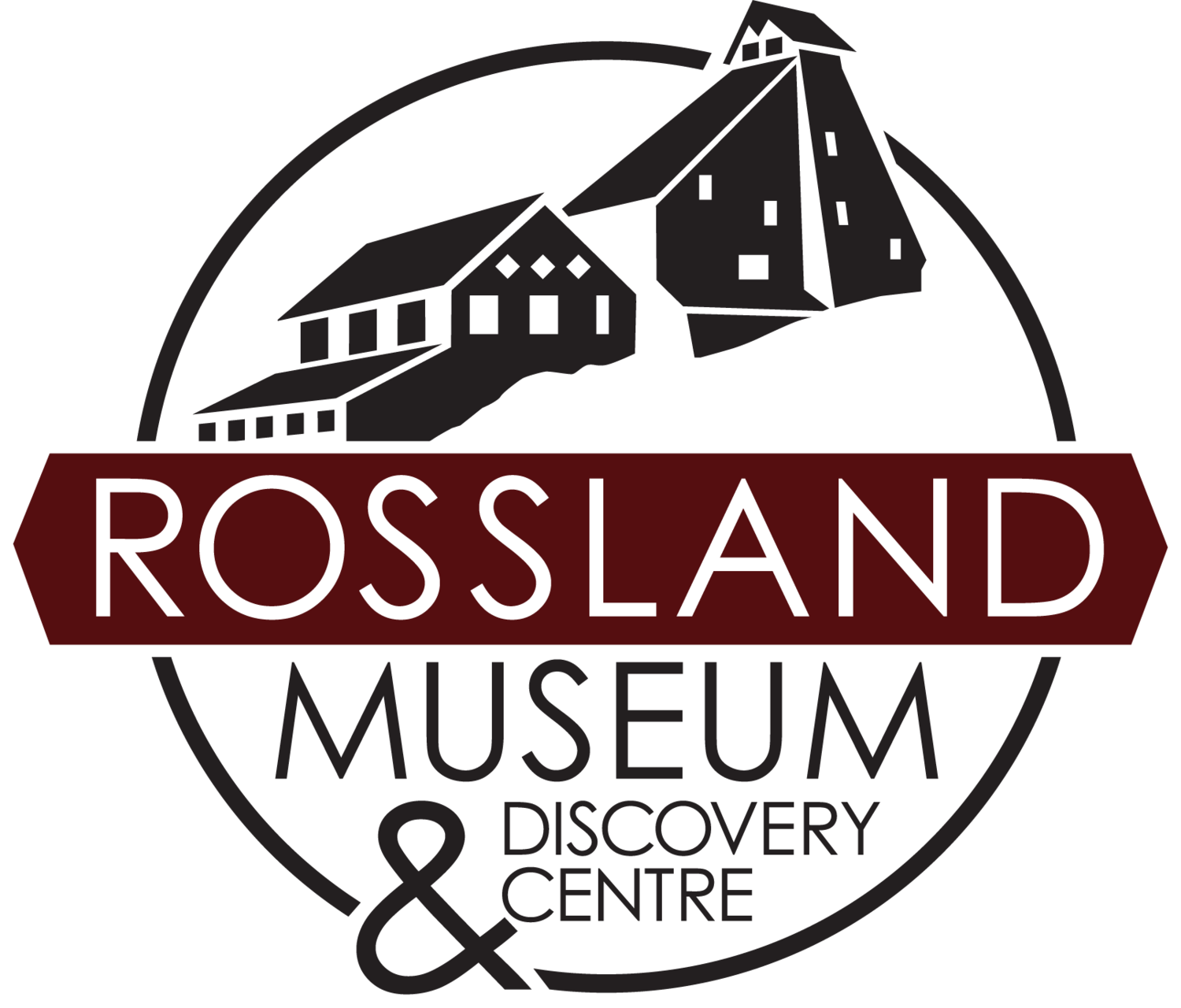
Alice Jesse Weber - "Old Lady Jess"
Alice Jesse Weber found herself in Rossland in the boomtown days of the late 1890s. She was raised in Kansas, and set off on her own as soon as she could. She headed west and rode the wave of gold rushes from California to Alaska. She married a Mr. Weber in Seattle and had a beautiful daughter; a picture of her daughter was one of her greatest treasures. According to Jess, her husband had not treated her well, and she left her family and drifted across the border to British Columbia, eventually settling in Rossland.

Quarantine and Isolation in Early Rossland
Caught up in the restrictions imposed in the attempt to control the covid-19 pandemic, it is interesting to look back at Rossland’s first attempt to contain an epidemic imported from abroad - in this case, a smallpox epidemic in 1900. The parallels with today are striking.

Agnew & Co.
In the decades following the Confederation of Canada, settlers flowed into the newly established western provinces. Some were from other lands, but many were from Ontario seeking new opportunities in agriculture, mining, and forestry. And where such industries prospered, merchants arrived to offer produce and services. This is the story of one merchant from Ontario who sought opportunities first in Dominion City, Manitoba, and then in Rossland, British Columbia.

Some Little Known Incidents And Characters From Rossland's Golden Age
These essays are extracted from a longer work on law and order in early Rossland that is still in progress. I have assembled this collection of stories from the gold-boom days -- some short, some quite long -- in the hope that you will find the incidents and characters interesting and perhaps entertaining and that they will give you new insights into the early history of the city that we all called home for so many years. I know that not everyone is interested in history, particularly in historical minutia, and that some of you may find that these essays are too long and detailed for your interests and tastes. That is understandable, but such is the nature of my research. I try to explore people and events that are ignored or glossed over in standard histories and document them in sufficient detail that the story is as accurate as possible given the usually fragmentary historical records. I provide a very brief sketch of the subject of each essay below. With this as your guide, you may want to dip into the essays here and there to see if there is anything that interests you. Perhaps you would want to start with the final essay about the unhappy Nellie Lake.

Yes, There Was Skiing Before We Built The Chairlift
The Red Mountain chair lift transformed skiing in Rossland; it did not create it. Before the lift, the skiing community was active and vibrant, both athletically and socially. Skiing was not skiing as we know it today, in equipment, technique, skill, speed or the terrain casually conquered in a day on the slopes, but we had slalom, downhill of a sort and cross country races -- and a skilled and daring cadre of jumpers. Everyday skiing, however, was essentially Nordic, on the fields, trails and mountains north of the city, with the beginnings of alpine skiing on the steep slope adjacent to the ski cabin. Skiing occurred mostly on weekends, but our local hill had lights so we also had skiing at mid-week. Often, after skiing, the ski cabin rocked with music, singing and stomping that passed as dancing. We had exercise and we had fun, but most of us did not ski very well. The ski club was as much a social as it was an athletic institution. The story of skiing in the pre-lift days deserves to be told and retold. It was an important part of the history of that unique community, Rossland, that we know and love. This essay is my attempt to fill in some neglected aspects of that history.

The Chinese and Chinatown of Rossland
I grew up in what was left of Rossland’s Chinatown in the late 1930s and 1940s and I have long wondered about the histories of the few Chinese men that I knew, particularly Lui Joe who sold us vegetables and old half-blind John who was the last resident of the Chinese Masonic Hall across the street from our house and who occasionally sawed wood in the middle of the night. Unfortunately, I cannot resurrect their stories but as I was preparing a history of my family I began to wonder about the broader history of the section of town in which I once lived and of the Chinese men who inhabited it.

Olaus Jeldness by Ron Shearer
Olaus Jeldness was a "mining man," but he is a legend in Rossland, British Columbia, not for his accomplishments in mining, but for his exploits on skis. Yet, despite his local fame, surprisingly little is known about his life and some of the details regularly repeated in the extant literature are incorrect. In his adult life, skiing was important, at times a basic means of locomotion in winter, but more generally a relaxing and exhilarating relief from the stresses and anxieties of dangerous and demanding everyday activities. However, at root his life was an odyssey through the mining camps of North America (and some in Europe), in a determined quest for ever elusive riches, always guided by the optimistic belief that the next hole in the ground would deliver the big bonanza. His personal bonanza was found on an isolated mountainside outside Rossland. It gave him a modest personal fortune and for an extended time he led a prosperous life style. However, he died in less than prosperous circumstances, a victim of his own speculative nature and the depression of the 1930s. This paper reports what I have discovered in my attempt to understand Olaus Jeldness and his life.
-
2024
- Mar. 14, 2024 A Legend Carved in the Slopes: The History of the Grey Mountain Grind Mar. 14, 2024
- Feb. 29, 2024 Speaker Series Replay: “The Ice Man from British Columbia” with Bill Hanlon Feb. 29, 2024
- Jan. 16, 2024 History of the S.S. Rossland Jan. 16, 2024
-
2023
- Dec. 6, 2023 Red Mountain Volunteer Ski Patrol Dec. 6, 2023
- Jul. 30, 2023 An Introductory History of Pride in the West Kootenays Jul. 30, 2023
- Feb. 14, 2023 Behind the Curtain: The History of the Rossland Light Opera Players Feb. 14, 2023
- Feb. 8, 2023 James W. Thompson Feb. 8, 2023
- Jan. 18, 2023 Smelter Wars by Ron Verzuh Jan. 18, 2023
-
2022
- Nov. 1, 2022 Rossland Red Cross: Women's Volunteer Service During the Second World War Nov. 1, 2022
- Nov. 1, 2022 Air Raid Precautions (ARP): Rossland Civilian Defence During the Second World War Nov. 1, 2022
- Nov. 1, 2022 James "Jimmy" Harper: Flight Lieutenant in the Royal Canadian Air Force (WWII) Nov. 1, 2022
- Nov. 1, 2022 Garth "Bunny" Beley: Flight Officer in the Royal Air Force (WWII) Nov. 1, 2022
- Nov. 1, 2022 Benjamin "Ben" Allen: Private in Princess Patricia's Canadian Light Infantry (WWI) Nov. 1, 2022
- Mar. 30, 2022 Jessie McQueen Mar. 30, 2022
- Mar. 30, 2022 The Rossland Club Mar. 30, 2022
- Feb. 8, 2022 Thor Heyerdahl Feb. 8, 2022
-
2021
- Dec. 14, 2021 Mike Wigley - Tales from a Splitboarder: Walking to Glory Dec. 14, 2021
- Nov. 9, 2021 Harry Measure: "Mountain Resorts & Resort Communities: Origins & Future Opportunities." Nov. 9, 2021
- Nov. 5, 2021 William "Spike" Treverton - Signalman for the 2nd Canadian Infantry Division WWII Nov. 5, 2021
- Nov. 5, 2021 Percival Knight Allen - Trooper for the Lord Strathcona's Horse Boer War Nov. 5, 2021
- Oct. 26, 2021 Rossland's Historic Cemeteries Oct. 26, 2021
- Jul. 20, 2021 Adrian Leslie: Whitebark Pine Ecosystem Restoration Jul. 20, 2021
- Jul. 9, 2021 The Gold Fever Follies: A Rossland Tradition for Over 30 Years! Jul. 9, 2021
- May 27, 2021 Cindy Devine: "Ticket to Ride" - Cultivation of a Champion May 27, 2021
- May 13, 2021 Marilyn James: Sinixt Dialect Revitalization, Countermapping, and Resurgence May 13, 2021
- Mar. 31, 2021 The Miners’ Union Hall (circa 1898) + The Rossland Provincial Courthouse (circa 1900)" Mar. 31, 2021
- Feb. 17, 2021 The "Spanish Flu" in Rossland Feb. 17, 2021
-
2020
- Nov. 5, 2020 Pte. Alfred Lindsay - Canadian Infantry 7th Battalion WWI Nov. 5, 2020
- Nov. 3, 2020 Edmund "Eddie" Thomas Cox - RCAF Pilot Officer (WWII) Nov. 3, 2020
- Oct. 30, 2020 The Rebekahs Oct. 30, 2020
- Oct. 28, 2020 Phyllis Gregory Turner Ross Oct. 28, 2020
- Oct. 27, 2020 Alice Jesse Weber - "Old Lady Jess" Oct. 27, 2020
- Oct. 21, 2020 "The Girl" - A Memoir by Susie McClung Inghram (1936) Oct. 21, 2020
- Jun. 11, 2020 The Flying Steamshovel Jun. 11, 2020
- May 22, 2020 Quarantine and Isolation in Early Rossland May 22, 2020
- May 21, 2020 British Columbia Firefighters’ Museum May 21, 2020
- May 5, 2020 The Liberation of the Netherlands and Victory in Europe (V-E) Day - May 1945 May 5, 2020
- Mar. 30, 2020 #MuseumAlphabet Mar. 30, 2020
- Feb. 25, 2020 Rossland Range Plane Crash Feb. 25, 2020
- Jan. 10, 2020 Music City: The Rossland City Band Jan. 10, 2020
-
2019
- Jul. 8, 2019 Was Rossland built on a dormant volcano? Jul. 8, 2019
- Jul. 5, 2019 Inventing the Walkie Talkie Jul. 5, 2019
- Jan. 25, 2019 Agnew & Co. Jan. 25, 2019
-
2018
- Oct. 10, 2018 Some Little Known Incidents And Characters From Rossland's Golden Age Oct. 10, 2018
- Aug. 14, 2018 Ross Thompson Aug. 14, 2018
- Aug. 14, 2018 Yes, There Was Skiing Before We Built The Chairlift Aug. 14, 2018
- Aug. 14, 2018 Mid-Winter Mardi Gras: Rossland's Winter Carnival Aug. 14, 2018
- Aug. 14, 2018 The Chinese and Chinatown of Rossland Aug. 14, 2018
- Aug. 14, 2018 Olaus Jeldness by Ron Shearer Aug. 14, 2018
